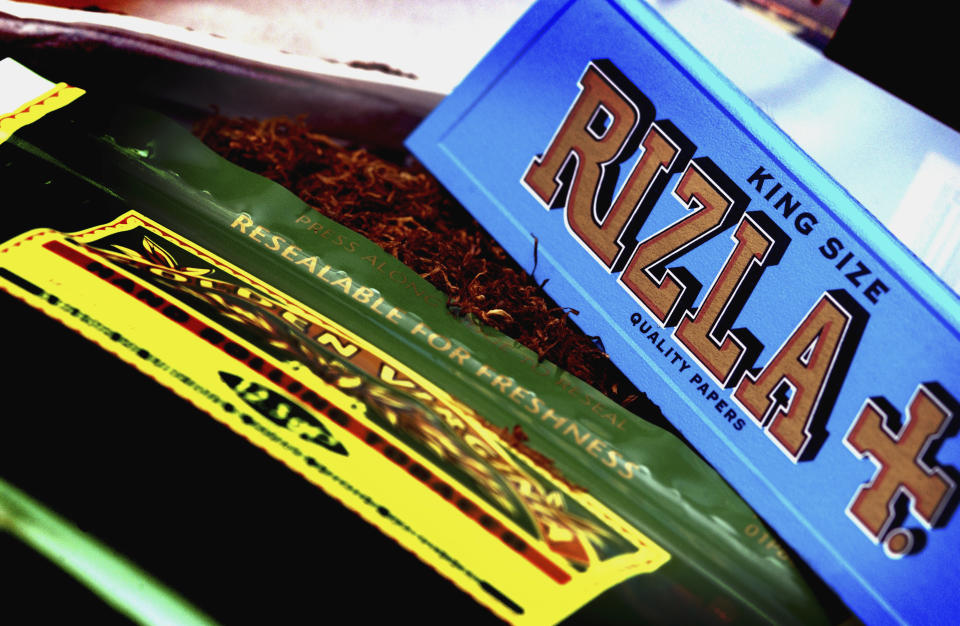What to watch: Rizla-maker hit by Duty Free closure, airlines stocks bounce, and unemployment claims jump

Here are the top business, market, and economic stories you should be watching today in the UK, Europe, and abroad:
Rizla-maker hit by duty free closure
Tobacco giant Imperial Brands’ (IMB.L) stock plunged on Tuesday after the company slashed its dividend and warned that COVID-19 would weigh on sales.
Imperial’s joint interim chief executives Dominic Brisby and Joerg Biebernick said the impact of the pandemic had so far been “small” but was expected to be “more pronounced in the second half” of the year, as travel bans hit Duty Free sales and consumers use up stockpiles of cigarettes.
Imperial Brands makes Rizla rolling papers, Golden Virginia rolling tobacco, and Davidoff and Gauloises cigarettes, among other brands.
The warning on second-half sales came as Imperial reported what Brisby and Bierbernick admitted were disappointing half-year results. Revenue increased by 2% to £14.6bn ($17.6bn) but operating profit fell by 19.6% to £925m.
Brisby and Biebernick said they would “rebase” Imperial’s dividend in response, slashing it by a third.
Imperial’s stock fell over 6%.
Airline stocks bounce
Airline stocks continued to rally strongly on Tuesday.
British Airways-owner IAG (IAG.L) topped the FTSE 100, rising 6.4%. Low-cost rival easyJet (EZJ.L) gained 2.4%, which was still enough to put it among the best performers on the blue chip index.
Travel stocks have been among the worst hit since the COVID-19 pandemic struck but have begun to recover over the last few sessions.
“Airline and travel stocks have picked up where they left off yesterday with more strong gains this morning with British Airways owner IAG having another good session,” said Micheal Hewson, chief market analyst at CMC Markets. “It is up 20% this week already, followed by Easyjet which is also up over 20% since last Thursday.”
Transport minister Grant Shapps on Monday evening hinted that the UK may allow “air bridges” between the UK and countries with similar infection levels, doing away with the need for a 14-day quarantine for any visitors.
Unemployment claims jump
Unemployment claims surged by 69.1% in Britain swiftly after the coronavirus lockdown began.
The latest data from the Office for National Statistics (ONS) on Tuesday is the most comprehensive yet on how the pandemic has rippled through the UK labour market.
It shows the number of claims for jobseekers’ allowance and universal credit claimants looking for work spiked between March and April, reaching 2.1 million.
European stocks 'losing steam'
European stock markets couldn’t hang on to early gains on Tuesday, opening marginally higher before quickly falling into the red.
The pan-European Stoxx 600 (^STOXX) index, Britain’s FTSE 100 (^FTSE), France’s CAC 40 (^FCHI), and Germany’s DAX (^GDAXI) all traded slightly higher at the open.
However, by 10.25am London time, the FTSE 100 was down 0.5%, the DAX was 0.4% lower, and the CAC 40 was down 0.6%.
“European shares were firmer at the open before losing steam quickly,” said Neil Wilson, chief analyst at Markets.com.
More government cash for big firms
The UK government has quadrupled the amount large firms can borrow as part of its coronavirus lending scheme, in exchange for “restraint” on dividends and bonuses.
Britain’s chancellor Rishi Sunak had already rolled out a vast £330bn emergency package of loans and guarantees to protect firms as the UK went into lockdown in March.
The Treasury has now ramped up lending limits from £50m to £200m for large firms, in a fresh sign of the heavy toll on company balance sheets as the pandemic and lockdown drag on.
Brexit tariff regime announced
The UK government confirmed in a statement that it will maintain a 10% tariff on cars but will cut taxes on tens of billions of dollars of supply chain imports under its new regime, known as the UK Global Tariff (UKGT).
It claims that the UKGT will be simpler and cheaper than the EU's Common External Tariff and it will apply to countries with which it has no agreement and will remove all tariffs below 2%.
“For the first time in 50 years we are able to set our own tariff regime that is tailored to the UK economy,” said international trade secretary Liz Truss.
New car sales in the EU crashed by 76% in April
New car registrations almost ground to a halt in the European Union in April, as coronavirus lockdowns were in full swing, keeping people in their homes and car plants and dealerships shut.
Passenger car registrations plunged by over 76% last month from April 2019, according to data released on Tuesday by the European Automobile Manufacturers Association (ACEA).
April saw the biggest yearly drop since ACEA record-keeping began, with carmakers selling just 270,682 new cars — compared to over 1.1 million in April 2019.
Business leaders fear ‘prolonged’ recession and mass unemployment
Global business leaders fear the legacy of the COVID-19 pandemic will be a “prolonged global recession” and mass unemployment.
The World Economic Forum (WEF) on Tuesday published a new report examining the medium and long-term risks posed by the COVID-19 pandemic. The report was based on a survey of 350 “senior risk professionals” spanning industries from banking to retail.
It found businesses leaders across the world fear long-lasting dire economic consequences as a result of the pandemic.
68% said they expected a “prolonged” global recession. 56.8% said a wave of bankruptcies were likely and 49.3% expect to see high unemployment, particularly among young people.

 Yahoo Finance
Yahoo Finance 